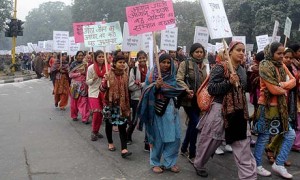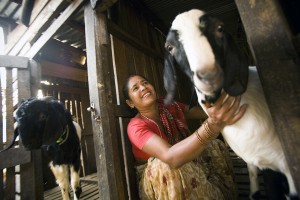In our hometown paper here in Little Rock, Ark., news of murder and rape charges against five of the men accused of gang-raping a 23-year-old woman aboard a moving bus in India made the front page today. The attack and subsequent uprising and cry for change is front and center in thousands of newspapers and online news sites around the world. If you aren't paying attention, it's time to start. This is an unprecedented moment in India's history and in the cause of women's rights around the world.
 Protesters in New Delhi take part in a silent march to demand justice for the 23-year-old woman who was raped and killed. ZUMA/Rex Features/The Guardian
Protesters in New Delhi take part in a silent march to demand justice for the 23-year-old woman who was raped and killed. ZUMA/Rex Features/The Guardian
A report in The Guardian quotes Ranjana Kumari of the Centre for Social Research as saying "Can this grief, this anger at the brutalization and murder of a young woman result in positive change? What we are seeing on our streets is a defining moment of our democracy. ... For decades, India's endemic violence against women has been a defining issue for women's groups and the rights movement, but for the first time the crime of sexual offense and rape has been taken up by the people themselves."
Rapes have become frequent in India, with complaints increasing 25 percent from 2006 to 2011. More than 220,000 incidents were reported in 2011 alone, according to Indian government statistics cited in a CNN report. What's notable is that now, finally, the issue is getting the global attention it deserves, though at the horrible cost of the brutality endured not just by the medical student who died of her injuries but also of the scores of women who bore the pain of such an attack in silence.
The Arkansas Democrat-Gazette article cites Kishwar Desai's opinion piece in The Indian Express that said the gang rape illustrated to some that "a certain class of men is deeply uncomfortable with women displaying their independence, receiving education and joining the workforce. The gang rape becomes a form of subduing the women, collectively, and establishing their male superiority."
He goes on to say "the answer lies in correcting the manner in which families value men and women, and the emotional disconnect between them."
Author Ranjana Kumari said "for decades, NGOs, women's groups, human rights organizations have been pushing against this wall of institutional sexism; now a part of that wall has broken down and we must seize this moment."
Heifer International includes gender equity training in its projects around the world, many of which include traditional cultures that limit the rights and freedoms of women. Special trainings just for men explain the value of women's contributions and help them understand that working together will improve the lives of all, men, women and children. Women have their own sessions and organize in self-help groups to pool savings and start small businesses.
In Bangladesh, one of the gender equity trainings for men led Mohammad Huzzatullah, a man who had returned from work outside the country with means to make a difference, to sponsor his own women's group. Read more about his story in World Ark here, or in our digital edition on iPad and Android tablets.
Every day, Heifer's investment in women and training in women's empowerment change lives. In just one example, in Nepal, Heifer participant Ganga Khanal once suffered abuse from her husband and believed herself that women and girls were not as important as men.
 Ganga Khanal shows off her Heifer goats in her family's pen in Jirouna, Nepal. Photo by Geoff Oliver Bugbee
Ganga Khanal shows off her Heifer goats in her family's pen in Jirouna, Nepal. Photo by Geoff Oliver Bugbee
"I used to be guilty as well in believing it was more important to educate or provide for my sons than for my daughters. But the trainings changed all that for me. Today, my daughter is in the army. She has made me realize and understand that girls are no less than boys."
Her 17-year-old son Sudip learned that same lesson. "Looking at my mom, I have changed my view of women, and I have so much more respect for them and confidence in them. I used to laugh at them sitting in their groups and thought they would never do anything good. But just seeing them grow through the years through the project and seeing them buy land, build community buildings, form businesses, it's just been so overwhelming.
"I have so much respect for these women who have created opportunities for people like me," Sudip said. "The future looks bright for us because of our moms."
Development organizations, women's rights groups and governments should all take this moment in history at its full weight. Change is already happening. Please add your voice to the chorus and speak up for women's rights. Write us at worldark@list.heifer.org or comment on this post. Please click here to contribute to Heifer's women's empowerment projects.
Today's article in The Lancet medical journal wraps it up best, "The greatest respect we can give to the memory of the Indian student who died on Dec. 29 is by protecting and strengthening the political and social rights of women worldwide."